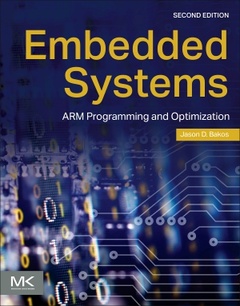Embedded Systems (2nd Ed.) ARM Programming and Optimization
Langue : Anglais
Auteur : Bakos Jason D.

Embedded Systems: ARM Programming and Optimization, Second Edition combines an exploration of the ARM architecture with an examination of the facilities offered by the Linux operating system to explain how various features of program design can influence processor performance. The book demonstrates methods by which a programmer can optimize program code in a way that does not impact its behavior but instead improves its performance. Several applications, including image transformations, fractal generation, image convolution, computer vision tasks, and now machine learning are used to describe and demonstrate these methods. From this, the reader will gain insight into computer architecture and application design, as well as practical knowledge in embedded software design for modern embedded systems. The second edition has been expanded to include more topics of interest to upper level undergraduate courses in embedded systems.
1. The Linux/ARM embedded platform Chapter
2. Multicore and data-level optimization: OpenMP and SIMD Chapter
3. Arithmetic optimization and the Linux Framebuffer Chapter
4. Memory optimization and video processing Chapter
5. Embedded heterogeneous programming with OpenCL
Appendix
A. Adding PMU support to Raspbian for the Generation 1 Raspberry Pi
B. NEON intrinsic reference
C. OpenCL reference Index
2. Multicore and data-level optimization: OpenMP and SIMD Chapter
3. Arithmetic optimization and the Linux Framebuffer Chapter
4. Memory optimization and video processing Chapter
5. Embedded heterogeneous programming with OpenCL
Appendix
A. Adding PMU support to Raspbian for the Generation 1 Raspberry Pi
B. NEON intrinsic reference
C. OpenCL reference Index
Jason D. Bakos is a professor of Computer Science and Engineering at the University of South Carolina. He received a BS in Computer Science from Youngstown State University in 1999 and a PhD in Computer Science from the University of Pittsburgh in 2005. Dr. Bakos’s research focuses on mapping data- and compute-intensive codes to high-performance, heterogeneous, reconfigurable, and embedded computer systems. His group works closely with FPGA-based computer manufacturers Convey Computer Corporation, GiDEL, and Annapolis Micro Systems, as well as GPU and DSP manufacturers NVIDIA, Texas Instruments, and Advantech. Dr. Bakos holds two patents, has published over 30 refereed publications in computer architecture and high-performance computing, was a winner of the ACM/DAC student design contest in 2002 and 2004, and received the US National Science Foundation (NSF) CAREER award in 2009. He is currently serving as associate editor for ACM Transactions on Reconfigurable Technology and Systems.
- Covers three ARM instruction set architectures, the ARMv6 and ARMv7-A, as well as three ARM cores, the ARM11 on the Raspberry Pi, Cortex-A9 on the Xilinx Zynq 7020, and Cortex-A15 on the NVIDIA Tegra K1
- Describes how to fully leverage the facilities offered by the Linux operating system, including the Linux GCC compiler toolchain and debug tools, performance monitoring support, OpenMP multicore runtime environment, video frame buffer, and video capture capabilities
- Designed to accompany and work with most low-cost Linux/ARM embedded development boards currently available
- Expanded to include coverage of topics such as bus architectures, low-power programming, and sensor interfacing
- Includes practical application areas such as machine learning
Date de parution : 02-2024
Ouvrage de 320 p.
19x23.4 cm
Thèmes d’Embedded Systems :
© 2024 LAVOISIER S.A.S.



